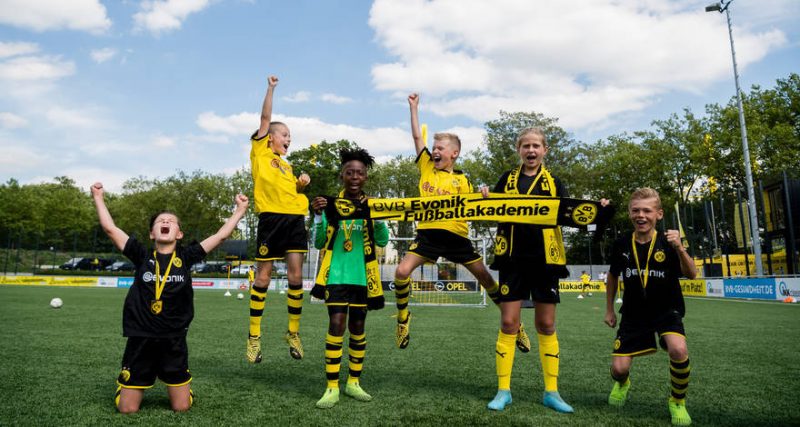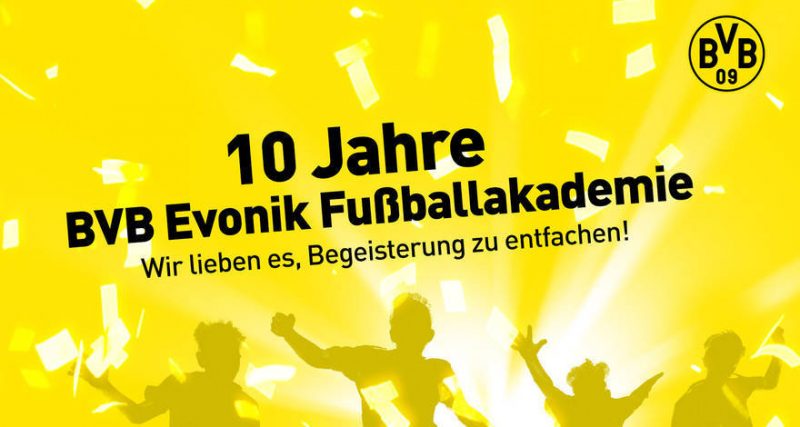The BVB Evonik Football Academy has grown from a typical start-up with a manageable degree of organisation to a highly professional place sought out by children and young people, with operations all over the world.
It all started with: Sylt?! And an obsession. That was in the summer of 2007. Four years later, on 21 July 2011, Borussia Dortmund put out a press release: “The time has come,” it said. “Next Monday, BVB will open its own football school in Rabenloh, in the shadow of Signal Iduna Park.” And it is now celebrating ten years of existence. It is now called the BVB Evonik Football Academy and has grown from a typical start-up with a manageable degree of organisation and maximum demands on the improvisation skills of all those involved to a highly professional place sought out by children and young people, with operations all over the world. We talked about the amazing Black and Yellow success story with three people who were part of the project from the very start: Christian Diercks, Jan Frederik Luig and Bärbel Huber were there on day one – and they are still there today.
How it all started
Back from Sylt. In the summer of 2007, Tim Suplicki took part in the holiday football school run by ex-professional Michael Rummenigge. Tim is the son of Olaf Suplicki (pictured). In late 2004, at the height of BVB’s financial crisis, which threatened the very existence of the club, he initiated and co-founded the supporters’ association – and also headed it in the first years of its existence. He returned from Sylt with a new idea: Borussia also needs a football school like that! The idea turned into a long drawn out obsession mainly because although the Black and Yellows had survived the worst of the crisis in 2007, funds were still in short supply. That meant putting his idea into practice took a little longer than planned. But, as anyone who knows Suplicki knows: once he gets something in his head… In 2010, the idea really started gaining momentum. The first team had long since moved their training operations to Brackel. The former “Am Rabenloh” site was more or less empty. And in Carsten Cramer, the new director of sales and marketing, Olaf Suplicki found a hardcore fan and supporter of his idea. Nine months later, the first holiday courses started. And with space for 500 participants … they sold out!
An empty notepad – a full to-do list
Jan Frederik Luig, 37, who only came to the BVB youth department from SC Paderborn in the summer of 2010, remembers: “I was asked in autumn 2010 if I could imagine taking over the sporting department in the club’s own football school.” He didn’t have to think for a long time before making his decision. Soon after, the masterminds behind the academy were sitting around a large table with a pen in their hand and several question marks in their heads. In front of them were empty notepads. “We really started at square one,” says Luig. At the end of the kick-off meeting, his pad was almost full – full of plenty of ideas, but above all with a very specific to-do list. These were his tasks for the coming weeks. It was old-school project management. At the very top of the list: 1. Devising a sporting concept and 2. Getting in the coaching staff. “Of course, we first spoke to the people in charge of training our own youth teams. But then we also spoke to people outside the club. We started with a really small team,” recalls Jan Frederik Luig. We didn’t even have ten coaches at the beginning – today there are more than 80!
From an autograph collector to the head of the academy
One of those coaches there in the beginning was Christian Diercks. Born in Essen, he had grown up as a BVB fan, collecting the autographs of the first team at the Rabenloh training ground as a child. He acquired his coaching licence at a very early age, studied sport in Cologne and worked at the youth performance centre of Alemannia Aachen. When he read on the team’s homepage that Borussia Dortmund were planning to open a football school and were looking for coaches, the next step was somewhat logical. Diercks joined as a coach on a part-time basis and quickly started running numerous courses – and now, 35 years young, he runs the entire academy.
Bärbel Huber – a specialist in the feel-good factor
And then there was – and still is – Bärbel Huber: the player’s wife with a difference. Married to BVB legend Lothar Huber, she has worked at the club for more than 25 years, initially as manager of the fan shop in August-Lenz-Haus, then later as the boss at the Rabenloh site, respected by all. Some call the Huber the “matron”, others the “mother” of the academy. The 62-year-old has a lot to say: about how BVB had to call around amateur clubs in Dortmund during Ottmar Hitzfeld’s time in search of an alternative location because he could not train on the “field” at the Rabenloh site after rain or snow had fallen. Or that Roman Weidenfeller was always the last to leave – long after everyone else – after extensive recovery sessions in the sauna and jacuzzi. But above all, Bärbel Huber knows the history and stories of the BVB Evonik Football Academy. “In the first year, we used to write the lists of participants on courses by hand. We packed the equipment for the children in plastic bags and labelled the bags and drinking bottles with a marker pen. The children had lunch in the stadium’s old media room,” she says. “At first, a lot of improvisation was called for. Don’t overthink it – just do it.” Learning by doing or training on the job are common buzzwords today. “Real manual work,” says Bärbel Huber, who is a little more straight-talking. And real teamwork. “The team spirit was great. After training, the whole group sat together for a long time, chatted and thought about what we can do differently and better. Some of the coaches barely went home.”
From camp beds and snowy mountain passes
Christian Diercks and Jan Frederik Luig, video analyst at BVB’s youth performance centre, who played a part in the promotion of the U23s to the 3. Liga, also have their own anecdotes to contribute. Like the one about the academy’s first away day. They had arranged a course in Sassenberg over Easter of 2012. Shinji Kagawa made a special guest appearance. The coaches did the shopping for dinner at the local supermarket and slept on camp beds in the changing rooms of the amateur club. The first trips abroad were also rather adventurous and exotic. “When we got inquiries from other countries, at first we visited the clubs and looked at the general conditions there. One of these early tours brought Jan Frederik to Austria. As the rental car he had booked was not available in Klagenfurt, he took a very small car and headed off towards Kitzbühel. With his sat nav set to “shortest possible route”, he was led through the winding roads of a snowy mountain pass and had to battle driving snow. His confidence of ever reaching his destination faded with every metre he climbed up the mountain.
Hand-knitted socks and the annual souvenir photo
Ten years on, the football school, which was launched at breakneck speed, is a professionally managed enterprise. “But there is still a familial atmosphere,” says Bärbel Huber, who takes personal responsibility for the feel-good factor. Even if I don’t know everyone anymore.” But everyone, in turn, knows her. Several children and young people have been coming for years. Time and time again. And with them come their parents. Some bring Bärbel Huber, who gets cold very quickly when the weather turns, hot water bottles, hand-knitted socks or a stiff drink to help with the cold. Since 2011, others have taken a souvenir photo with her every year. These have turned into entire photo galleries, which hang, framed, on the wall. The improvisation of the early days has now given way to routine. The academy has destinations in Asia, the USA and South America and works with numerous partners and, in addition to pure football know-how, also conveys the social values that are particularly important to the club. The club’s commitment to social issues is an integral part of the work. For example, BVB, together with former player and club ambassador Dédé, organised a workshop in Sao Paulo for coaches who work with children and young people from the favelas – the poor areas of the densely populated city. There, the coaches are actually more like social workers than football coaches.
Coronavirus as an accelerator of digitization
It is experiences like these that give Christian Dierck goosebumps every time. In the past 15 months, such moments have been less frequent than usual. Of course, the Covid-19 pandemic also hit the work of the football academy hard. “In the summer and autumn of 2020, we were still able to carry out most of our courses in Germany under strict hygiene rules,” he says. “Internationally, it was very difficult and challenging, because there were different rules everywhere.” With the strict lockdown from November last year, the academy largely came to a standstill. So Diercks and his team made a virtue out of necessity. “Our YouTube channel has several videos and offers not only goalkeeping training to do at home, but also home courses and challenges.” What’s more, we are currently working on a digital training platform as a tool for establishing a worldwide network. We have really gone full throttle on that now. Coronavirus has significantly accelerated the project.” Make no mistake: what happens out on the pitch will be just as important. The digital world and the real world are becoming intertwined. The football academy set the course early in that regard. In the summer of 2031, the academy will celebrate again. Its twentieth anniversary…
Article from the Borussia, issue 184 – July 2021







